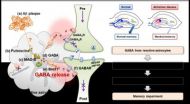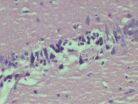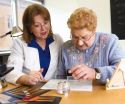(Press-News.org) VIDEO:
This is a movie showing how the reactive astrocytes in the brains of Alzheimer's disease model produce the inhibitory transmitter GABA by the enzyme MAO-B and release GABA through the...
Click here for more information.
Alzheimer's disease, which is the most common cause of dementia, is fatal and currently, there is no cure. In Alzheimer's disease, brain cells are damaged and destroyed, leading to devastating memory loss. It is reported that 1 in 8 Americans aged 65 or over have Alzheimer's disease. In 2011, 7,600 elderly people with dementia lost their way back home and became homeless in Korea. However, to date, there has been no clear understanding of the mechanisms underlying dementia in Alzheimer's disease. So far, neuronal death is the only proposed mechanism available in scientific literature.
The research team led by Dr. C. Justin Lee at Korea Institute of Science and Technology (KIST) and Dr. Daesoo Kim(KAIST) discovered that reactive astrocytes* in the brains of Alzheimer's disease model mice produce the inhibitory transmitter GABA** by the enzyme Monoamine oxidase B***(MAO-B) and release GABA through the Bestrophin-1 channel to suppress normal information flow during synaptic transmission. Based on this discovery, the team was able to reduce the production and release of GABA by inhibiting MAO-B or Bestrophin-1, and successfully ameliorate impairments in neuronal firing, synaptic transmission and memory in Alzheimer's disease model mice.
In the behavioral test, the team used the fact that mice tend to prefer dark places. If a mouse experiences an electric shock in a dark place, it will remember this event and avoid dark places from then on. However, a mouse with modeled Alzheimer's disease cannot remember if such shock is related to dark places and keeps going back to dark places. The team demonstrated that treating these mice with a MAO-B inhibitor fully recovered the mice's memory. The selegiline**** is currently used in Parkinson's disease as an adjunct therapy and considered as a one of best promising medicine for MAO-B inhibitor. But it has been previously shown to be less effective in Alzheimer's disease.
The team proved that selegiline is effective for a short time, but when it is used in long term, it loses its efficacy in Alzheimer's disease model mice. When treated for 1 week, selegiline brought the neuronal firing to a normal level. But when it was treated for 2 and 4 weeks, neuronal firing came back to the levels of untreated mice. From these results, the team proposed that there is a pressing need for a new drug that has long lasting effects.
Dr. C. Justin Lee said, "From this study, we reveal the novel mechanism of how Alzheimer's patients might lose their memory. We also propose new therapeutic targets, which include GABA production and release mechanisms in reactive astrocytes for treatment of Alzheimer's disease. Furthermore, we provide a stepping stone for the development of MAO-B inhibitors with long lasting efficacy."
INFORMATION:
This research has been conducted at the WCI Center for Functional Connectomics, Brain Science Institute, Korea Institute of Science and Technology (KIST) in collaboration with the domestic and international research teams including KAIST. This research was funded by the Ministry of Science ICT and Future Planning (MSIP) and the National Research Foundation of Korea (NRF) as part of the World Class Institute Project and the KIST Brain Science Institute's Flagship Project.
*Astrocytes
Astrocytes are the most abundant cell type of the human brain. They perform many functions, including biochemical support of endothelial cells that form the blood–brain barrier, provision of nutrients to the nervous tissue, maintenance of extracellular ion balance and a role in the repair and scarring process of the brain and spinal cord following traumatic injury.
** gamma-Aminobutyric acid (GABA)
γ-Aminobutyric acid or GABA is the chief inhibitory neurotransmitter in the mammalian central nervous system. It plays a role in regulating neuronal excitability throughout the nervous system. In humans, GABA is also directly responsible for the regulation of muscle tone
*** Monoamine oxidase B (MAOB)
Monoamine oxidase B, also known as MAOB, is an enzyme that in humans is encoded by the MAOB gene. The protein encoded by this gene belongs to the flavin monoamine oxidase family. It is an enzyme located in the outer mitochondrial membrane. It catalyzes the oxidative deamination of biogenic and xenobiotic amines and plays an important[citation needed] role in the metabolism of neuroactive and vasoactive amines in the central nervous system and peripheral tissues.
**** Selegiline
Selegiline is a drug used for the treatment of early-stage Parkinson's disease, depression and dementia. In normal clinical doses it is a selective irreversible MAO-B inhibitor.
Discovery of new drug targets for memory impairment in Alzheimer's disease
Scientists investigate the cause of memory impairment through GABA from reactive astrocytes
2014-07-09
ELSE PRESS RELEASES FROM THIS DATE:
Neuroprotective effects of low concentration of lithium
2014-07-09
Lithium, as a neuroprotective agent, benefits for neuronal survival. Recent cDNA array studies have demonstrated that mood stabilizer lithium exhibits neuroprotective effects through multiple targets. Dr. Riadh Nciri and his team, Purpan Medicine Faculty, Paul Sabatier University, France, exposed SH-SY5Y cells to 0.5 mmol/L lithium carbonate for 25-50 weeks and then detected the expression levels of some neurobiology related genes and post-translational modifications of stress proteins in SH-SY5Y cells. cDNA arrays showed that pyruvate kinase 2 (PKM2) and calmodulin 3 expression ...
Filiform needle acupuncture versus antidepressant drugs for poststroke depression
2014-07-09
Whether acupuncture or antidepressant drugs exhibit better therapeutic effects on poststroke depression remains disputed. The effectiveness of acupuncture for poststroke depression can be evaluated by evidence-based medicine studies, which provide evidence for clinical application. Systematic review or meta-analysis studies have demonstrated that early acupuncture is superior to conventional western medicine in the treatment of poststroke depression. However, high-quality literatures are needed to further validate the effectiveness of acupuncture for poststroke depression. ...
What aggravates hippocampal neuronal injury in acute cerebral ischemia?
2014-07-09
Activation of extracellular signal-regulated kinase 1/2 has been demonstrated in acute cerebral ischemia. Yaning Zhao and her colleagues, Hebei United University, China induced transient whole-brain ischemia by four-vessel occlusion in normal and diabetic rats and intravenously injected diabetic rats with extracellular signal-regulated kinase 1/2 30 minutes before ischemia as a pretreatment. Results showed that during the pathological progression of cerebral ischemia/reperfusion in rats, activation of extracellular signal-regulated kinase 1/2 exhibits protective effect ...
Depression in AMD patients with low vision can be halved by integrated therapies
2014-07-09
SAN FRANCISCO – July 9, 2014 – The first clinical trial to examine integrated low vision and mental health treatment has shown that the approach can reduce the incidence of depression by half among people with low vision due to age-related macular degeneration (AMD). The results of the study were published online today in Ophthalmology, the journal of the American Academy of Ophthalmology.
Low vision is a visual impairment that interferes with a person's ability to perform everyday tasks and cannot be corrected with glasses, contact lenses, medicine or surgery. A common ...
Rehabilitation helps prevent depression from age-related vision loss
2014-07-09
Depression is a common risk for people who have lost their vision from age-related macular degeneration (AMD), but a new study shows that a type of rehabilitation therapy can cut this risk in half. The study was funded by the National Eye Institute (NEI), part of the National Institutes of Health.
"Our results emphasize the high risk of depression from AMD, and the benefits of multi-disciplinary treatment that bridges primary eye care, psychiatry, psychology, and rehabilitation," said Barry Rovner, M.D., a professor of psychiatry and neurology at the Sidney Kimmel Medical ...
Researchers led by Stanford engineer figure out how to make more efficient fuel cells
2014-07-09
Solar power and other sources of renewable energy can help combat global warming but they have a drawback: they don't produce energy as predictably as plants powered by oil, coal or natural gas. Solar panels only produce electricity when the sun is shining, and wind turbines are only productive when the wind is brisk.
Ideally, alternative energy sources would be complemented with massive systems to store and dispense power – think batteries on steroids. Reversible fuel cells have been envisioned as one such storage solution.
Fuel cells use oxygen and hydrogen as fuel ...
Children on dairy farms less likely to develop allergies
2014-07-09
The occurrence of allergic diseases has risen dramatically in Western societies. One frequently cited reason is that children are less exposed to microorganisms and have fewer infections than previous generations, thereby delaying maturation of the immune system.
A study by researchers at Sahlgrenska Academy, University of Gothenburg, monitored children until the age of three to examine maturation of the immune system in relation to allergic disease. All of the children lived in rural areas of the Västra Götaland Region, half of them on farms that produced milk.
Lower ...
USC scientists discover immune system component that resists sepsis in mice
2014-07-09
Molecular microbiologists from the Keck School of Medicine of the University of Southern California (USC) have discovered that mice lacking a specific component of the immune system are completely resistant to sepsis, a potentially fatal complication of infection. The discovery suggests that blocking this immune system component may help reduce inflammation in human autoimmune and hyper-inflammatory diseases such as rheumatoid arthritis and Type 2 diabetes.
The study was published online on June 23 in The Journal of Experimental Medicine, a leading peer-reviewed scientific ...
Thyroid hormone protects hippocampal cholinergic neurons in normal aged animals
2014-07-09
Can thyroid hormone protect neuronal function and increase the survival rate of naturally aged animals? Prof. Ailing Fu and her team, School of Pharmaceutical Sciences, Southwest University, China performed an animal experiment in which aged mice were administered with low dose of levothyroxine for 3 consecutive months. Results showed that the aged rats exhibited an obvious improvement in cognitive and an increased rat survival rate from 60% to 93%. The underlying mechanism was demonstrated that levothyroxine treatment can increase the levels of choline acetyltransferase ...
Nasal mucosal inhalation of AD vaccine attenuates Aβ1-42-induced cytotoxicity
2014-07-09
Cholinergic inhibitors and N-methyl-D-aspartate receptor antagonists can alleviate the symptoms of Alzheimer's disease, but fail to affect irreversible cognitive dysfunction and effectively scavenge amyloid beta peptide in the brain. Amyloid beta peptide (Aβ) vaccines reduced and eliminated Aβ deposition in an Alzheimer's disease (AD) transgenic mouse model, and significantly improved behavioral and cognitive impairment. Dr. Yunpeng Cao and his team, First Affiliated Hospital of China Medical University, China immunized AD transgenic mouse models with Plp-Adeno-X-CMV-(Aβ3-10)10-CpG ...
LAST 30 PRESS RELEASES:
Cal Poly’s fifth Climate Solutions Now conference to take place Feb. 23-27
Mask-wearing during COVID-19 linked to reduced air pollution–triggered heart attack risk in Japan
Achieving cross-coupling reactions of fatty amide reduction radicals via iridium-photorelay catalysis and other strategies
Shorter may be sweeter: Study finds 15-second health ads can curb junk food cravings
Family relationships identified in Stone Age graves on Gotland
Effectiveness of exercise to ease osteoarthritis symptoms likely minimal and transient
Cost of copper must rise double to meet basic copper needs
A gel for wounds that won’t heal
Iron, carbon, and the art of toxic cleanup
Organic soil amendments work together to help sandy soils hold water longer, study finds
Hidden carbon in mangrove soils may play a larger role in climate regulation than previously thought
Weight-loss wonder pills prompt scrutiny of key ingredient
Nonprofit leader Diane Dodge to receive 2026 Penn Nursing Renfield Foundation Award for Global Women’s Health
Maternal smoking during pregnancy may be linked to higher blood pressure in children, NIH study finds
New Lund model aims to shorten the path to life-saving cell and gene therapies
Researchers create ultra-stretchable, liquid-repellent materials via laser ablation
Combining AI with OCT shows potential for detecting lipid-rich plaques in coronary arteries
SeaCast revolutionizes Mediterranean Sea forecasting with AI-powered speed and accuracy
JMIR Publications’ JMIR Bioinformatics and Biotechnology invites submissions on Bridging Data, AI, and Innovation to Transform Health
Honey bees navigate more precisely than previously thought
Air pollution may directly contribute to Alzheimer’s disease
Study finds early imaging after pediatric UTIs may do more harm than good
UC San Diego Health joins national research for maternal-fetal care
New biomarker predicts chemotherapy response in triple-negative breast cancer
Treatment algorithms featured in Brain Trauma Foundation’s update of guidelines for care of patients with penetrating traumatic brain injury
Over 40% of musicians experience tinnitus; hearing loss and hyperacusis also significantly elevated
Artificial intelligence predicts colorectal cancer risk in ulcerative colitis patients
Mayo Clinic installs first magnetic nanoparticle hyperthermia system for cancer research in the US
Calibr-Skaggs and Kainomyx launch collaboration to pioneer novel malaria treatments
JAX-NYSCF Collaborative and GSK announce collaboration to advance translational models for neurodegenerative disease research
[Press-News.org] Discovery of new drug targets for memory impairment in Alzheimer's diseaseScientists investigate the cause of memory impairment through GABA from reactive astrocytes





